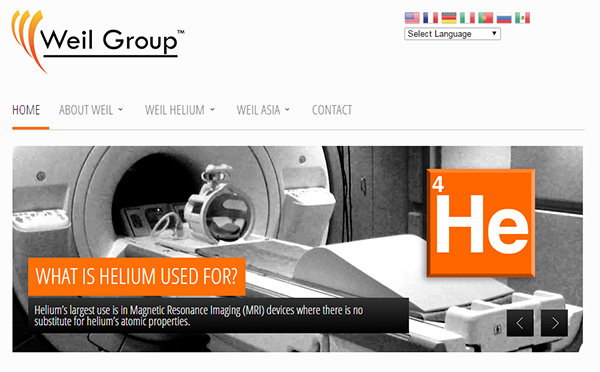Armed with a fresh round of cash, a local firm is digging into the Canadian hinterlands to find a return for its investors.
The Weil Group, headquartered at 416 W. Franklin St., recently completed a $7 million capital raise, according to documents filed with the Securities and Exchange Commission.
Weil Group CEO Jeff Vogt said the money will be used to float the company’s investments in helium mining, including a forthcoming $10 million facility in Saskatchewan.
Vogt said he sees diminishing supply in North America for helium and increased demand for its uses for cooling of superconducting magnets in MRI machines and other industrial applications. He said the company wants to bite off a piece of a helium market that consumes about 7 billion cubic feet of the gaseous element annually worldwide.
“We’re a small piece of that,” he said.
The latest capital raise, which gathered money from about three dozen investors over the last year, adds to a total pool of about $15 million that’s gone into the company’s bet on helium.
Its facility in Saskatchewan is being built through a deal with Linde Group, an international industrial firm that will construct the facility and use the gas it produces.
Vogt described the area where the company is working as farmland in a fairly harsh Canadian landscape.
“It’s where the deer and the antelope don’t even play,” he said.
Helium is created by underground forces and floats up, usually mixed with nitrogen, Vogt said. The facility will drill down 5,000 to 7,000 feet, extract the gas and purify it to what’s known as five-nine helium – that is, helium that’s 99.999 pure.
Vogt said similar facilities will follow over the next two years in Alberta, Canada, and in Montana.
The seeds of The Weil Group (pronounced ‘While’) were planted in 2004, while Vogt was working for a company that did emissions tests on vehicles in Asia. His background was originally in politics, working in a business liaison position in the administration of President George H.W. Bush., after graduating from Colby College in Maine.
“I’m not an engineer. I’m not a geologist,” he said. “I met a man in mining in the Philippines who needed help. I said, ‘It sounds like fun.’”
He put seed capital into that venture, which mined nickel.
“We started with a few hundred thousand bucks,” Vogt said. “Before we knew it, the Chinese were clamoring for nickel for stainless steel.”
He formally started Weil, a moniker derived from the middle name of Vogt and his grandfather, in 2009 to get into oil and gas exploration and mining in Columbia and other parts of South America.
Vogt admits that Richmond isn’t the obvious headquarters locale for a company that does business in Canadian mines. His reason for setting up shop here was simple: he married a woman from Richmond.
“I go to conferences and have a name tag that says Richmond and people scratch their head,” he said.
On the ground here in Richmond, Weil Group has three employees and has found a few of its investors in town. The company doesn’t do any of the drilling or processing; rather, it farms out those tasks. It works in the initial stages to acquire leases and get mineral rights on land it thinks is promising for mining.
As for how it goes about finding the right sites to dig for helium or whatever given substance it is in search of at the time, Vogt wasn’t willing to give up too many tricks of the trade.
“We just smell it,” he said jokingly. “Whether its oil, gas or any commodity, you have to understand the rock and where it comes from – the geology and the underworld activity.”
In the case of helium, it’s usually a byproduct of liquid natural gas facilities, he said.
Vogt also wouldn’t say what sort of revenue levels can be expected as a result of its bet on helium.
“We’ve proven a sufficient reserve to bring a healthy return,” he said. “And that’s my primary focus.”
Patience is a virtue in Weil Group’s business, Vogt said, taking more than a year to commission a site and turn the gas into a marketable product.
And not every hole in the ground leads to riches.
“Sometimes when you drill, you don’t find what you’re looking for,” he said.
Armed with a fresh round of cash, a local firm is digging into the Canadian hinterlands to find a return for its investors.
The Weil Group, headquartered at 416 W. Franklin St., recently completed a $7 million capital raise, according to documents filed with the Securities and Exchange Commission.
Weil Group CEO Jeff Vogt said the money will be used to float the company’s investments in helium mining, including a forthcoming $10 million facility in Saskatchewan.
Vogt said he sees diminishing supply in North America for helium and increased demand for its uses for cooling of superconducting magnets in MRI machines and other industrial applications. He said the company wants to bite off a piece of a helium market that consumes about 7 billion cubic feet of the gaseous element annually worldwide.
“We’re a small piece of that,” he said.
The latest capital raise, which gathered money from about three dozen investors over the last year, adds to a total pool of about $15 million that’s gone into the company’s bet on helium.
Its facility in Saskatchewan is being built through a deal with Linde Group, an international industrial firm that will construct the facility and use the gas it produces.
Vogt described the area where the company is working as farmland in a fairly harsh Canadian landscape.
“It’s where the deer and the antelope don’t even play,” he said.
Helium is created by underground forces and floats up, usually mixed with nitrogen, Vogt said. The facility will drill down 5,000 to 7,000 feet, extract the gas and purify it to what’s known as five-nine helium – that is, helium that’s 99.999 pure.
Vogt said similar facilities will follow over the next two years in Alberta, Canada, and in Montana.
The seeds of The Weil Group (pronounced ‘While’) were planted in 2004, while Vogt was working for a company that did emissions tests on vehicles in Asia. His background was originally in politics, working in a business liaison position in the administration of President George H.W. Bush., after graduating from Colby College in Maine.
“I’m not an engineer. I’m not a geologist,” he said. “I met a man in mining in the Philippines who needed help. I said, ‘It sounds like fun.’”
He put seed capital into that venture, which mined nickel.
“We started with a few hundred thousand bucks,” Vogt said. “Before we knew it, the Chinese were clamoring for nickel for stainless steel.”
He formally started Weil, a moniker derived from the middle name of Vogt and his grandfather, in 2009 to get into oil and gas exploration and mining in Columbia and other parts of South America.
Vogt admits that Richmond isn’t the obvious headquarters locale for a company that does business in Canadian mines. His reason for setting up shop here was simple: he married a woman from Richmond.
“I go to conferences and have a name tag that says Richmond and people scratch their head,” he said.
On the ground here in Richmond, Weil Group has three employees and has found a few of its investors in town. The company doesn’t do any of the drilling or processing; rather, it farms out those tasks. It works in the initial stages to acquire leases and get mineral rights on land it thinks is promising for mining.
As for how it goes about finding the right sites to dig for helium or whatever given substance it is in search of at the time, Vogt wasn’t willing to give up too many tricks of the trade.
“We just smell it,” he said jokingly. “Whether its oil, gas or any commodity, you have to understand the rock and where it comes from – the geology and the underworld activity.”
In the case of helium, it’s usually a byproduct of liquid natural gas facilities, he said.
Vogt also wouldn’t say what sort of revenue levels can be expected as a result of its bet on helium.
“We’ve proven a sufficient reserve to bring a healthy return,” he said. “And that’s my primary focus.”
Patience is a virtue in Weil Group’s business, Vogt said, taking more than a year to commission a site and turn the gas into a marketable product.
And not every hole in the ground leads to riches.
“Sometimes when you drill, you don’t find what you’re looking for,” he said.




